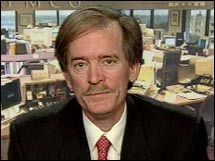 |
| Bill Gross, managing director of the nation's largest bond fund, says the nomination of Ben Bernanke as Federal Reserve chairman should keep bond yields in check. |
|
|
|
|
|
NEW YORK (CNN/Money) -
Bill Gross, managing director of the nation's largest bond fund, says the appointment of Ben Bernanke to be the next chairman of the Federal Reserve should help keep intermediate and long-term Treasury yields in check, and that he expects Bernanke to stop hiking interest rates early next year.
"I view him favorably, especially his views on inflation targeting," Gross wrote in his most recent commentary on the Web site for Pimco, his bond fund.
Bernanke is an advocate of tying the Fed action setting short-term interest rates to explicit inflation targets as a way of promoting both price stability and transparency for Fed policy. Several overseas central banks have such inflation targets as part of their stated policy.
"Inflation-targeting central banks in other parts of the world, such as the United Kingdom and implicitly the European Central Bank, have economies with lower inflation and lower long-term yields than here in the United States," Gross wrote. "Admittedly their economies (Euroland) and accounting standards (U.K.) promote lower yields, but inflation targeting is part of the explanation as well since it induces a greater degree of confidence in the admittedly fragile value of paper money."
Gross also believes that the Fed will stop hiking rates soon after the expected start of Bernanke's term in February.
Gross wrote that the gap between interest rates and the rate of inflation is the key measure of whether the central bank's closely watched short-term rate, the Fed funds rate, is approaching the neutral level the Fed has been seeking.
He says that suggests the Fed is getting close to an end of rate hikes after 11 straight quarter percentage point boosts.
He also wrote that the increase in certain intermediate-term bond yields, and how long they've been rising (more than two years), is enough to slow the economy or even spark a mild recession, especially given pressures on the federal budget and this year's big jump in energy prices.
"By the time 10-year and 2-year Treasuries reach parity, as is almost the case now, the economy is typically slowing and the Fed is at or near the end of its tightening cycle," Gross wrote. "We are due for what appears to be a 2 percent or less Gross Domestic Product growth rate in 2006, a rate sure to stop the Fed and to induce eventual ease at some point later in the year."
"It will likely be Bernanke's first policy shift and an indicator of his willingness to address the Fed's dual mandate of inflation targeting and economic growth," Gross added.
For more on Bernanke's selection to succeed Alan Greenspan, click here.

|